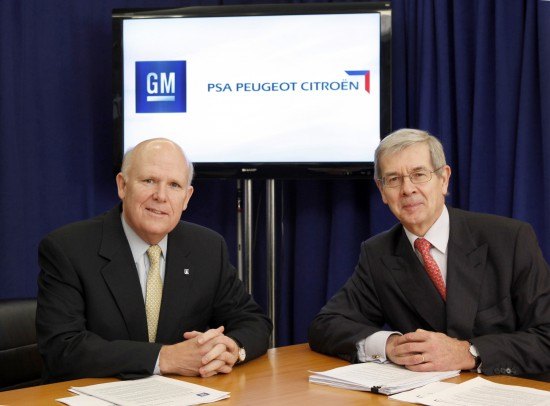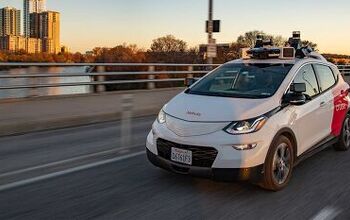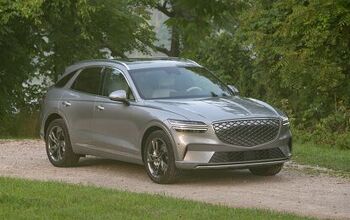GM Sells PSA Peugeot Citroen Stake For A $150 Million Gain, Blesses Dongfeng/PSA Tie-Up
GM CEO Dan Akerson and PSA CEO Phillipe Varin when the tie-up between their two companies was announced in 2012. Now, Akerson and Varin are both on their way out and GM has sold its 7% stake in PSA, though the companies continue to jointly work on some projects.
General Motors sort of has a reputation for bad investments in Europe. In 2000, GM made a deal with Fiat wherein Fiat sold 20% of Fiat Auto to GM for $2.4 billion and the Italian automaker took a 6% stake in GM. GM also received a put option which in certain circumstances would have obligated the largest American car company to exercise that option and buy the rest of Fiat. In 2005, to get out of that deal, GM paid Fiat another $2 billion.
With that kind of history, it’s not surprising that when GM invested $400 million in early 2012 for a 7% share of French automaker PSA Peugeot Citroen many skeptics expected GM to lose money on that deal as well. PSA’s stock prices dropped after GM’s buy-in and in the fourth quarter of last year, GM took a $220 million charge on its books to bring the PSA investment down to market value. GM announced last Friday that it sold its ~24.8 million shares in PSA to institutional investors for $343 million. As a result of all that accounting the Detroit automaker will realize a net gain of $150 million, posted to the company’s fourth quarter earnings as a special item.
A day before GM announced their divestment of PSA shares, the two companies said they had reduced projected annual cost savings from their alliance to $1.2 billion by 2018, down from an earlier projection of $2 billion in savings by 2017. The companies will continue to work jointly on two vehicles based on PSA platforms, a joint purchasing and logistics venture, and also work together on a new small light commercial vehicle.
GM said that their sale of PSA shares was not related to the French concern’s announcement last week that it is exploring a possible capital increase and and considering commercial and industrial projects with partners. One of those partners is Chinese automaker Dongfeng Motor Group. Dongfeng and PSA recently said they would be exchanging 20% stakes after the Chinese company agreed to inject over $2 billion in PSA. Chinese media reports say that prior to its sale of PSA shares, GM gave it’s blessing to the alliance between the French and Chinese automakers.
More by TTAC Staff
Latest Car Reviews
Read moreLatest Product Reviews
Read moreRecent Comments
- Jeff Self driving cars are not ready for prime time.
- Lichtronamo Watch as the non-us based automakers shift more production to Mexico in the future.
- 28-Cars-Later " Electrek recently dug around in Tesla’s online parts catalog and found that the windshield costs a whopping $1,900 to replace.To be fair, that’s around what a Mercedes S-Class or Rivian windshield costs, but the Tesla’s glass is unique because of its shape. It’s also worth noting that most insurance plans have glass replacement options that can make the repair a low- or zero-cost issue. "Now I understand why my insurance is so high despite no claims for years and about 7,500 annual miles between three cars.
- AMcA My theory is that that when the Big 3 gave away the store to the UAW in the last contract, there was a side deal in which the UAW promised to go after the non-organized transplant plants. Even the UAW understands that if the wage differential gets too high it's gonna kill the golden goose.
- MKizzy Why else does range matter? Because in the EV advocate's dream scenario of a post-ICE future, the average multi-car household will find itself with more EVs in their garages and driveways than places to plug them in or the capacity to charge then all at once without significant electrical upgrades. Unless each vehicle has enough range to allow for multiple days without plugging in, fighting over charging access in multi-EV households will be right up there with finances for causes of domestic strife.


































Comments
Join the conversation
I guess the new and improved post-bankruptcy GM really is better - instead of taking years to lose billions in Europe, they now only lose 10's of millions over a few months. But seriously, how can they continue to be so stupid when it comes to European "investments", and how can they flip flop so quickly on their decisions?
-$400 million + $343 million = +$150 million, because I already wrote off $200 million. That must be MBA math! When I sell my house at a loss I must tell the bank that I already wrote off the outstanding part of the mortgage, so I'm going to keep all the money. They'll understand.